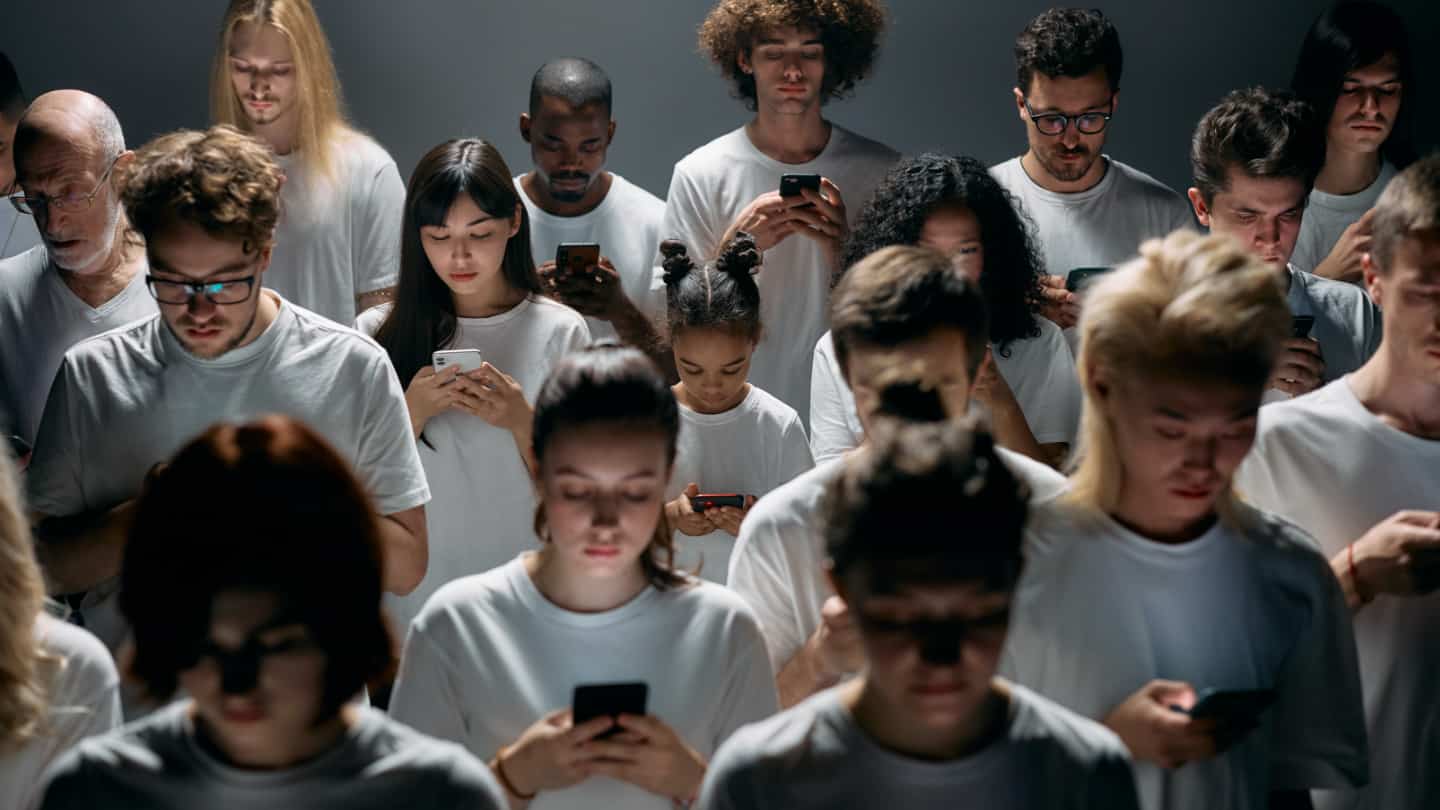Over the past ten years, arguably nothing has changed Americans’ daily lives more than the smartphone. We’ve gone from only 35 percent of Americans owning a smartphone to more than 81 percent.
We don’t just own them; many of us are owned by our phones, tethered to its screen for hours at a time. The sheer amount of time we spend on our screens is staggering. Americans average nearly five and a half hours per day on our smartphones, and younger Americans spend closer to six. About three-quarters of us say we are rarely more than five feet away from our cell phones.
Cell Phone Addiction and Mental Health
Does this mean every one of us is addicted? No. When our mobile phone use begins to interfere with our quality of life, that’s cause for concern:
- Do you find yourself ignoring the friends or family you’re with together to check social media?
- Does it seem like you never have enough time to complete your tasks and responsibilities, even though you spend hours on your phone each day?
- Have your hobbies taken a back seat to your phone use?
- Does being separated from your phone even briefly make you feel anxious or panicky?
If you said “Yes!” to at least one of those, it may be time to reassess your smartphone and internet usage. The Diagnostic and Statistical Manual of Mental Disorders (DSM-5 as it’s often called) is arguably the foremost reference book for counselors and therapists when treating situations like smartphone or internet addiction. In fact, DSM-5 is already linking phone addiction with many of the behavior patterns demonstrated by gambling addicts.
Just as someone with a gambling compulsion will continue placing bets even when their behavior is damaging their relationships, someone with a smartphone addiction may continue prioritizing their phone time over their real-life relationships and responsibilities.
Effects of Smartphone Addiction
Dopamine pathways. Smartphone addiction shares quite a few similarities with other behavioral addictions, such as compulsive gambling. We know that the neurotransmitter dopamine plays a role: each time we get a “like,” receive a glowing comment, or hear the ding of a new notification, a little hit of dopamine reinforces that positive feeling we get.
Some apps are specifically designed to take advantage of how our brains respond to dopamine in order to keep us coming back. This is a powerful motivator and can be challenging to overcome.
Loneliness. Perhaps the cruelest irony of social media is that while its purpose is to connect us, its result can be the opposite. Studies suggest that communication via smartphone is no substitute for real, face-to-face interaction with other human beings. Researchers have found that increased phone time correlates with increased feelings of loneliness. And loneliness is, in itself, a risk factor for many other psychological and physical problems.
Depression. Loneliness and depression can often go hand-in-hand. So it’s unsurprising that researchers have found a significant connection between phone addiction and depression.
Stress and anxiety. While many smartphone notifications are positive and give us a quick hit of dopamine, others are less enjoyable. A work email from an angry client or dissatisfied boss, a passive-aggressive text from a relative, a doom-and-gloom headline: they’re all instantly delivered to us at any time, day or night. Like dopamine, they have an influence on our brains, triggering our primitive ‘fight or flight’ reaction, releasing stress hormones, and keeping us in a near-constant state of high alert. It’s no wonder that high smartphone use is linked to increased stress, depression, and anxiety.
Impaired focus. The unending buzzing and dinging, the continuous urge to check your phone: these interruptions, no matter how short, have a negative impact on your ability to focus on important or complex projects. In other words, the things that really matter. This holds true for both your productivity at work and at home. Poor work performance and decreased productivity at home can cause you to feel more stress and lower self-esteem.
Sleep disruption. We have known for a long time that looking at our screens before bedtime is less than helpful. The blue light our smartphones give off actually inhibits melatonin, the hormone that regulates our sleep-wake cycle. Additionally, reading exciting news from a friend or an upsetting post on Facebook increases our alertness, making sleep more difficult. Inadequate sleep can lead to a wide range of mental and physical problems, from weight gain and a weakened immune system to mood swings, anxiety, and depression.
Self-absorption. When we spend so much time snapping the perfect selfie, coming up with clever posts, and presenting polished versions of ourselves, it’s unsurprising that research has shown a correlation between smartphone addiction and narcissism. In fact, excessive smartphone use seems to encourage narcissistic behavior even in people who are not classed as narcissists. This focus on self can in turn make it even more difficult to build healthy relationships in real life, away from the smartphone.
What Can I Do About My Smartphone Addiction?
While no addiction is easy to overcome, it is possible to overcome or at least limit phone addiction. There are many strategies you can use.
Limit screen time. Yes, it sounds easier than it is, but there is help. Decide how much time is reasonable to spend on each app per day, and then use timers to stick to your limit. You can even use tools such as Screen Time on your iPhone or Digital Wellbeing on your Android to help regulate your time.
Turn off notifications. Reclaim your focus by ruthlessly turning off push notifications. Buzzes, vibrations, and dings can’t rule your life if they never happen.
Set specific times for checking emails, social media, and newsfeeds. Keep anxiety and FOMO (fear of missing out) at bay by scheduling windows of time for communication and catching up with friends and news events.
Set a Shutoff Time for your screen. Thirty to sixty minutes before your own bedtime, put your smartphone to bed. Keep that melatonin coming, quiet your mind, and prepare for a restful night’s sleep. Maybe you can even pull out that novel or self-help book you’ve been meaning to read.
Replace some phone time with human interaction. We are hard-wired to need real relationships and a sense of community. Join a book club or recreational sports team. Find a church to attend. Invite the neighbors to take a walk. Build yourself some new, healthier dopamine pathways.
Smartphones are not evil; they can be immensely useful tools. The key is keeping them in their place and prioritizing our mental health and relationships.

